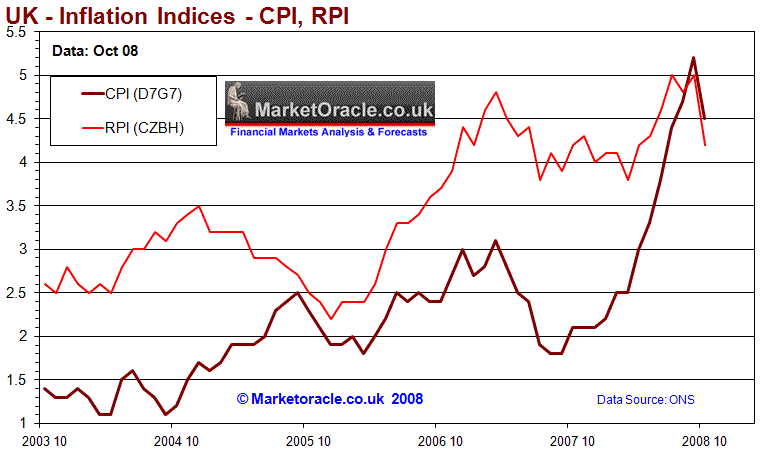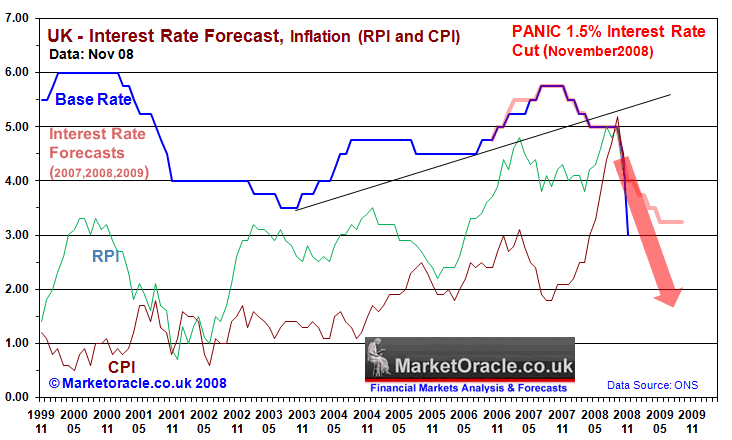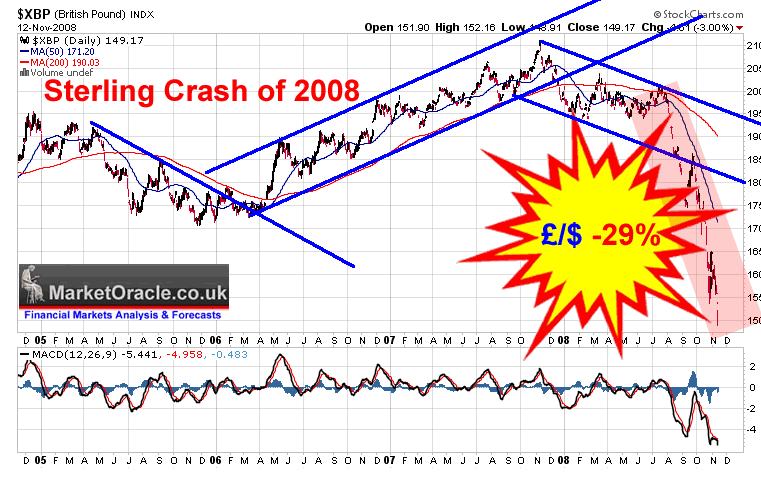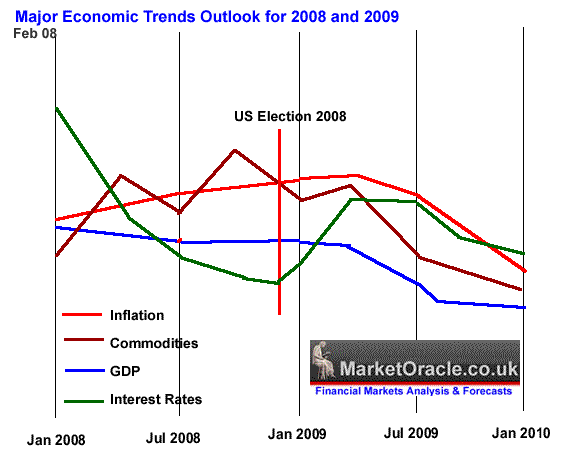UK Inflation CPI Falls Sharply as Economy Heads for Deflation
Economics / US Economy Nov 18, 2008 - 02:11 PM GMTBy: Nadeem_Walayat

 UK inflation as measured by the CPI slumped by the largest amount since the series began in 1997, falling from 5.2% to 4.5%. This follows hard on the heels of the Bank of England's panic 1.5% interest rate cut earlier in the month which was accompanied by BOE statements that UK economy would contract by 2% GDP during 2009, that puts the UK on target to experience a worse recession than that of the early 1990's as Gordon Browns boom turns to bust. The RPI measure which the BoE also warned was heading towards deflation i.e. a negative RPI during 2009 fell sharply from 5% to 4.2%.
UK inflation as measured by the CPI slumped by the largest amount since the series began in 1997, falling from 5.2% to 4.5%. This follows hard on the heels of the Bank of England's panic 1.5% interest rate cut earlier in the month which was accompanied by BOE statements that UK economy would contract by 2% GDP during 2009, that puts the UK on target to experience a worse recession than that of the early 1990's as Gordon Browns boom turns to bust. The RPI measure which the BoE also warned was heading towards deflation i.e. a negative RPI during 2009 fell sharply from 5% to 4.2%.

UK Interest Rates
The Bank of England's Monetary Policy Committee will have been aware of the sharp fall in inflation at the earlier November meeting and thus contributed towards the decision to cut interest rates by an near unprecedented 1.5% from 4.5% to 3%. Interest Rates are targeting a trend to below 2% by mid 2009.

Crash in Sterling
The consequences of sharp cuts in interest rates and both consumer and asset prices deflation is being made itself felt in the foreign exchange markets that have seen the British Pound crash by nearly 30% against the resurgent US Dollar and more than 22% against the Euro. Sterling has been heavily oversold for over 2 weeks, however despite this sterling continues to home in on the longer-term target of £/$1.37 which represents critical multi-decade support, below which would be parity to the US Dollar. I correctly called the US Dollar bottom in March 2008, and subsequent updates have confirmed the bullish trend amidst an overwhelming consensus anticipation for a crash in the US Dollar that is not going to happen. The US Dollar Bull Market , U.S. Dollar Bull Market Update. However whilst most currencies are falling against the Dollar, sterling is falling far more sharply than others which is as a consequence of the size of the depressed financial sector, and the lack of a manufacturing sector that could have benefited from a collapse in sterling.

 Deflation 2009 Followed by Stagflation in 2010
Deflation 2009 Followed by Stagflation in 2010
Deflation has not been seen in the UK since the 1930's Great Depression. The effect of deflation are worse than inflation as a deflationary spiral brings investment to a halt and the value of debts increases in real terms as wages contract, leaving borrowers worse off than people have experienced during the previous recessions of the post war period. The deflationary trend of late 2008 and 2009 was first warned of by myself way back in March 2008 - DELEVERAGING- Gold and Commodities Teetering on the Brink of a Bear Market? , the trend for which is now coming to pass as virtually all commodities have slumped following their forecast summer peaks.
Bankrupting Britain
Gordon Brown is homing in on the 2010 June Election deadline and has literally thrown all of the golden rules and prudent economic management handbooks into the dustbin with the consequence that the huge surge in government spending puts Britain on course to resemble a big version of Iceland. We have long left behind the £2 billion tax give away in advance of the May 2008 local and by elections. Now we are looking at money printing on a scale not seen of in our lifetimes, as UK debt is set to explode form the 40% of GDP limit to more than 100% of GDP by the June 2010 election.
I warned way back in April that the government debt would soar to above 60% of GDP by the end of 2009, at the time that seemed overly pessimistic where the consensus still went along with the view that the government would hold to the 40% GDP debt rule, now the consensus is again underestimating the amount of government borrowing that will take place during the next 12 months. I would not be surprised if a year from now UK debt was on target to hit 200% of GDP.
THIS IS HIGHLY INFLATIONARY ! Make no mistakes about it, the UK is heading for many years of stagflation following the deflation of 2009. But in the meantime we have to contend with deflation which is as a consequence of the economic bust that at this point in time looks set to put the UK on course for a recession on par with the early 1980's
For the latest in depth analysis and forecasts on the UK economy, interest rates and housing market subscribe to our always free newsletter.
By Nadeem Walayat
http://www.marketoracle.co.uk
Copyright © 2005-08 Marketoracle.co.uk (Market Oracle Ltd). All rights reserved.
Nadeem Walayat has over 20 years experience of trading derivatives, portfolio management and analysing the financial markets, including one of few who both anticipated and Beat the 1987 Crash. Nadeem's forward looking analysis specialises on the housing market and interest rates. Nadeem is the Editor of The Market Oracle, a FREE Daily Financial Markets Analysis & Forecasting online publication. We present in-depth analysis from over 150 experienced analysts on a range of views of the probable direction of the financial markets. Thus enabling our readers to arrive at an informed opinion on future market direction. http://www.marketoracle.co.uk
Disclaimer: The above is a matter of opinion provided for general information purposes only and is not intended as investment advice. Information and analysis above are derived from sources and utilising methods believed to be reliable, but we cannot accept responsibility for any trading losses you may incur as a result of this analysis. Individuals should consult with their personal financial advisors before engaging in any trading activities.
Attention Editors and Publishers! - You have permission to republish THIS article. Republished articles must include attribution to the author and links back to the http://www.marketoracle.co.uk . Please send an email to republish@marketoracle.co.uk, to include a link to the published article.
Nadeem Walayat Archive |
© 2005-2022 http://www.MarketOracle.co.uk - The Market Oracle is a FREE Daily Financial Markets Analysis & Forecasting online publication.


